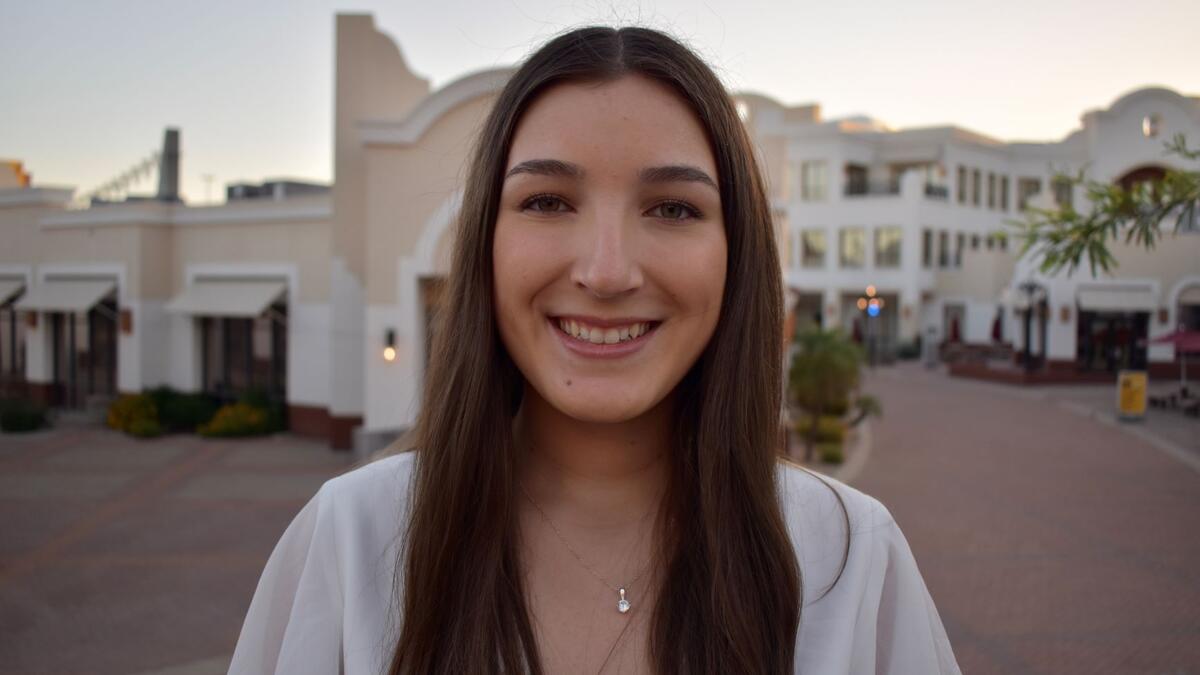2021 nursing graduate Lauren Aldana driven by passion for health care

Lauren Aldana is graduating ASU with a bachelor's degree in nursing with honors from Barrett, The Honors College.
Editor's note: This story is part of a series of profiles of notable spring 2021 graduates.
Lauren Aldana knows the power of positive affirmation from someone she respects and admires.
As an undergraduate nursing major, Aldana received a letter from Michael Crow, president of Arizona State University, praising her involvement in a course focusing on care for patients with dementia and Alzheimer’s.
“One of the most exciting accomplishments I had during my ASU career was receiving a personal letter of recognition from Michael Crow for my participation in an ASU introduction to dementia and Alzheimer’s course in partnership with Hospice of the Valley,” said Aldana, who is graduating this spring with a bachelor’s degree in nursing from the the Edson College of Nursing and Health Innovation with honors from Barrett, The Honors College at ASU.
“The letter from President Crow highlighted my efforts to learn more about the disease and provide companionship to an Alzheimer’s patient each week where I would bring board games and other activities for us to bond over. It was such an enlightening class and it made me proud to have been part of that experience,” said Aldana, who came to ASU from Huntington Beach, California.
Another point of pride for Aldana was receiving the Ella Burkhart National Merit Scholarship for the 2019–20 and 2020–21 school years. This prestigious scholarship is given to outstanding ASU nursing students who are National Merit Scholars.
Aldana capped off her undergraduate work at ASU with an honors thesis titled “Addressing Implicit Bias in Mental Healthcare: A Novel Health Promotion Tool for the Treatment of Minority Mental Health Patients.”
“The topic of implicit bias in mental health care became of interest to me when I was completing the psychiatric rotation in my nursing clinicals, where I noticed health care workers displaying bias during the treatment of these patients. I began to wonder if this bias was affecting parts of their assessment or treatment plans,” Aldana said.
Her thesis focused on the treatment of African American and Latino mental health patients and developing a tool called the Culturally Traumatic Events Questionnaire (CTEQ) that aims to assess for the specific life events that can be traumatic and impact a person’s mental health.
The CTEQ asks about exposure to specific traumatic experiences that African Americans and Latinos uniquely face that can negatively impact mental health and that are not currently being assessed for in other mental health assessment tools, Aldana explained.
For example, there are questions regarding discrimination, immigration experiences, documentation status and fearful encounters with law enforcement. It also gives patients the option to elaborate further on their responses rather than only giving patients the option to select "yes" or "no" for a question/experience. Additionally, it provides clear directions for next steps for the patient to take if they have been exposed to a significant amount of trauma and offers resources such as the National Suicide Prevention Lifeline and the Crisis Text Line.
“The CTEQ is a preliminary step in research that I would like to continue potentially in graduate school. Ideally, I would like to perform a randomized trial where the CTEQ is put to use in the mental health setting with minority patients and where the efficacy of the questionnaire can be tested,” Aldana said.
“This would allow me to see if changes need to be made to the questionnaire to effectively evaluate the trauma that African Americans and Latinos face that can affect their mental health. Once the CTEQ has been evaluated through more research with its use in the mental health setting, I would love to have both providers and nurses use it in practice.”
We caught up with Aldana and asked her to look back on her time at ASU and let us know her plans for the future. Here is what she had to say:
Question: What was your “aha” moment when you realized you wanted to study the field you majored in?
Answer: I always knew from a young age that I wanted to work in the medical field, but I didn’t quite know what type of health professional I wanted to be. I have always been a big believer in the healing that support can provide for people during times of hardship.
My mother was diagnosed with a chronic illness that impairs many parts of her daily activities. Growing up with this responsibility, I tried to be the biggest support system for my mom as I knew that even though I couldn’t help cure her illness, I could at least help her feel better and remind her that she is extremely loved and cared for.
I believe that nurses are able to do this in the clinical setting and be that support system for their patients, which I greatly admire and aspire to become.
Q: What’s something you learned while at ASU — in the classroom or otherwise — that surprised you or changed your perspective?
A: One thing I learned while at ASU is the importance and value of working as a team with others and utilizing others as resources.
I had a hard time accepting that sometimes in order to succeed you need to ask others for help and that you can’t do everything on your own.
I was lucky enough to have made a great support system of friends and classmates at ASU who all believed in me and were able to provide help when I needed it most. Without them, I don’t know how I would have done anything in college! This has definitely changed my perspective and has made me realize that it’s OK to ask for help.
Q: Why did you choose ASU?
A: I chose ASU not only because of its exceptional nursing and honors programs, but for the sense of community that I instantly felt on my first campus tour back when I was a senior in high school.
I knew that I wanted to go to college outside of California, but I also knew that I could only do that if I knew I would feel welcomed on campus. I never had any doubts of feeling unwelcomed or uncomfortable with fitting in at ASU. My campus tour solidified to me that I would be able to learn and grow here at ASU with the help of so many talented and welcoming people.
Q: Which professor taught you the most important lesson while at ASU? What was that lesson?
A: My thesis director Dr. Julie Sullivan taught me to never doubt myself or my abilities. When I asked her to be my thesis director and we began to work on my research, she saw something in me that inspired her to push me to succeed in my academics and personal life.
She could see that I was extremely motivated and had a lot to offer, but I had the tendency to doubt myself and my strengths. She truly taught me to embrace my strengths and my passion that I have for health care so that I can truly start to believe in myself and use my abilities to make a difference in the world.
Q: What’s the best piece of advice you’d give to those still in school?
A: The best piece of advice I’d give to those still in school is to always push yourself out of your comfort zone.
I have always had a hard time with change, but coming to ASU has taught me that change can actually bring you a lot of growth. Now I can confidently say that being pushed out of my comfort zone has brought me so much happiness and success that I don’t know I would’ve gotten from just staying comfortable.
Always take advantage of new opportunities brought to you and seek out ways that you can make yourself grow while in school, whether that be academically, physically or mentally.
Q: What was your favorite spot on campus, whether for studying, meeting friends or just thinking about life?
A: My favorite spot on campus to study and hang out with my friends were the library study rooms.
I loved the environment because it was my own personal study room with big whiteboards that I found super helpful to use to study. Since it was so private, I enjoyed inviting friends to come study with me and we would often play music and get a lot of work done there.
Q: What are your plans after graduation?
A: After graduation I hope to start in a new graduate nurse residency program in the ICU and to start my career as a bedside nurse. I completed my practice clinicals this last semester in the ICU and fell in love with the challenges it presented to me.
I would love to continue to work in the critical care field as a registered nurse. I am also inspired to eventually consider graduate school or a nurse practitioner program to further my education and practice.
Most of all, I would also love to come back to ASU and teach in the Edson College of Nursing and Health Innovation. I had the privilege of learning from excellent professors in my undergraduate program, and I would love to give back and teach future nursing students as well!
Q: If someone gave you $40 million to solve one problem on our planet, what would you tackle?
A: If I were given $40 million to solve a problem on our planet, I would tackle access to health care for all.
My thesis really demonstrated to me how unfair our health care system is and how it can marginalize certain populations. I would love to be able to use this money to ensure that everyone has access to quality health care for both physical and mental health problems. Not everyone has the privilege of living free of illness, but it is so important that everyone has the resources available to them to help ease this challenge.
More Health and medicine

College of Health Solutions launches first-of-its-kind diagnostics industry partnership to train the workforce of tomorrow
From 2007 to 2022, cytotechnology certification examinees diminished from 246 to 109 per year. With only 19 programs in the…

ASU's Roybal Center aims to give older adults experiencing cognitive decline more independence
For older people living alone and suffering from cognitive decline, life can be an unsettling and sometimes scary experience.…

Dynamic data duo advances health research
The latest health research promises futuristic treatments, from cancer vaccines to bioengineered organs for transplants…

